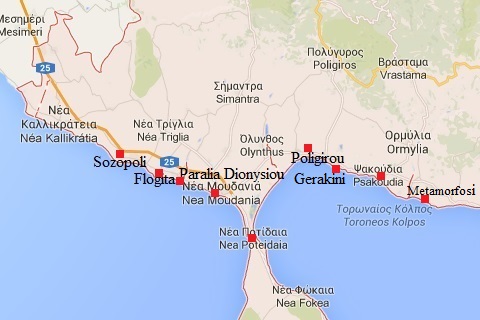
| The Greek Islands | Halkidiki | Athos | Sithonia | Kassandra |
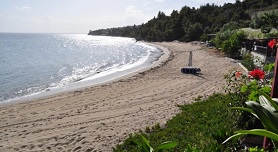 |
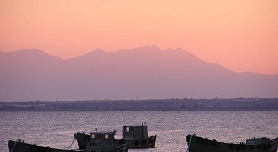 |
 |
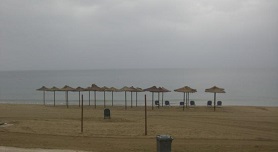 |
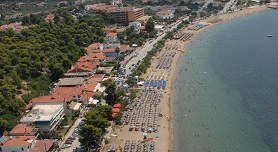 |
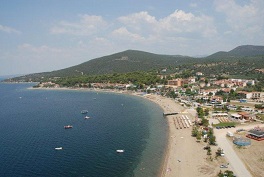 |
 |
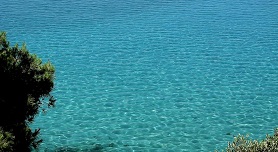 |
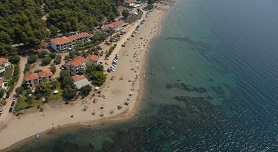 |
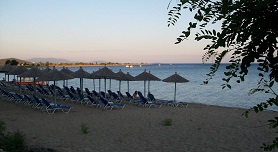 |
| THE VILLAGE AND THE BEACH OF PSAKOUDIA IN HALKIDIKI IN GREECE |
|
Psakoudia is actually the port of the town of Ormylia, which is situated above it. The village with its four-kilometer-long sandy beach on the coast of the Halkidiki area, between the Kassandra peninsula and the Sithonia peninsula. The distance to Thessaloniki is about 80 kilometers. The village Psakoudia itself is not very big, but because of the large beach it attracts many visitors are there are quite a few accommodations and facilities for tourists. Along the beach you will find shops, bars and fish tavernas, and there is also a campsite. Psakoudia is located in a area with a beautiful nature, and is surrounded by pine trees and olive groves. The village is also visited by people who want to see the mountains behind it. Psakoudia beach has received the Blue Flag because it is clean and safe for swimming. There are opportunities for diving and to practice other water sports. Psakoudia was once the site of the port of the oldest town in Halkidiki, Sermyli (which today is called Ormylia). Excavations show that Psakoudia was inhabited BC between 4000 and 2000. According to the historian Herodotus Sermyli was a large and important city in the 13th and 14th century BC. According to him the city also gave military aid to the Persians during the Persian wars. Coins that were minted after 400 BC shows that the city was autonomous. In 348 BC Sermyli was destroyed by the father of Alexander the Great, Philip II of Macedonia, and after that the survivors left the city. Northwest of the village of Psakoudia on two hills is the ancient site of Olynthus that dates to the 7th century BC. According to mythology Olynthus was the son of the king Strymonas of Thrace, and he was killed during a lion hunt. Olynthos would then be built in his honor by his brother Vraggas. Another myth is that Olynthos was the son of Hercules. Whatever may be true of these stories, the city of Olynthos was originally founded by people who were expelled from Macedonia and settled in Halkidiki. Little is known about Olynthos in the period before the Persian wars. In 480 BC the city supplied troops and ships to the Persian king Xerxes, but when the Persian army withdrew in 479 BC, the Persian army commander suspected treason, besieged and conquered the city, and had the inhabitants slaughtered. Olynthos was then given to the city of Torone. In 432 BC in view of the aggression from Athens King Perdiccas II of Macedon commanded to merge a number of cities in Halkidiki and make Olynthos into one large, better defensible capital of Halkidiki. Thus Olynthos became one of the major military powers in Greece. Over the years the town became increasingly powerful and constantly appropriated more acreage. This resulted in 382 BC in a war with Sparta which lasted three years. In 357 BC, when many Greek states were at war with Athens, Olynthos sided with King Phillip II of Macedonia (the father of Alexander the Great). Phillip II conquered all the towns in the area and Olythos became increasingly fearful for the growth of his power. They asked Athens for help, after which Phillip II in 348 BC besieged the city. He killed his two half-brothers (and also pretenders to the throne) Arrhidaeus and Menelaus who lived in Olynthos and destroyed the city completely. Olynthos never recovered anymore and was more or less forgotten. However the sudden destruction of the city has ensured that many objects from that period have been preserved on the site. These are now exhibited in the Archaeological Museum of Olynthos. The site itself is located just northeast of the present village Olynthos and can only be reached with own transport, because there are no buses go to it. For all hotels, apartments, studios and villas in Psakoudia - click here. |
| Pavloudis Apartments in Psakoudia, Chalkidiki, Greece - very good reviews |
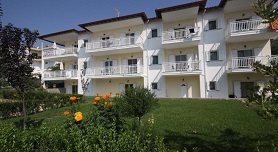 |
 |
 |
 |
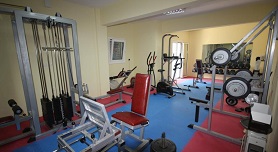 |
|
Within 250 metres from the sea, in the area of Psakoudia, Pavloudis Apartments offers self-catering accommodation with free Wi-Fi access and balconies overlooking the well-tended garden. It includes a fitness room and provides free private, on-site parking. The air-conditioned studios and apartments at Pavloudis include a kitchenette with mini fridge and coffee maker, and a TV. Each unit also has its own bathroom with shower and a hairdryer. The city of Thessaloniki is 80 km away, while Makedonia International Airport is at 70 km. Just a short walk away, you will find super markets, shops and restaurants. Check availabilities and prices & book Pavloudis Apartments in Psakoudia - click here. |
| Giannis Maria Apartments in Psakoudia, Chalkidiki, Greece - very good reviews |
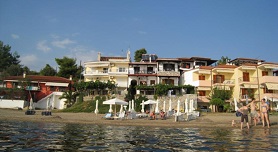 |
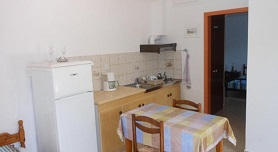 |
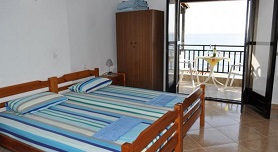 |
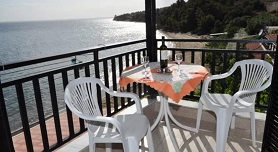 |
 |
|
Quietly located 20 metres from the beach of Psakoudia, Giannis Maria Apartments offers self-catering accommodation with free WiFi and balcony overlooking the Aegean Sea. Bars and restaurants are 200 metres away. All accommodation types at the Giannis Maria provide a TV and air conditioning. There is a kitchenette with a refrigerator and cooking facilities. The private bathroom comes with a shower. The property is located 7 km away from the lively town of Ormylia and 70 km from Thessaloniki International Airport. It is 21 km from Nea Moudania. The village of Nikiti with its sandy beach is at 17 km. Check availabilities and prices & book Giannis Maria Apartments in Psakoudia - click here. |
© Hans Huisman, https://www.angelfire.com/super2/greece/ 2015

